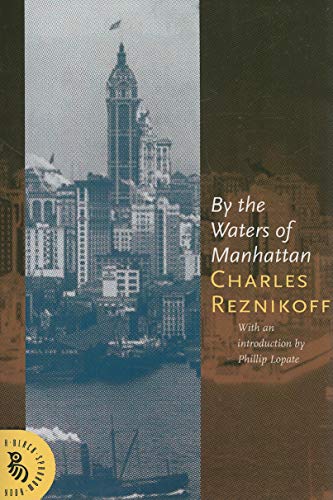


By the Waters of Manhattan (A Black Sparrow Book)
D**E
A fine novel exploring one family's emigration from Russia and settlement in NY
The above questions provide a simplified version of what this author presents us. Reznikoff is most famous for his carefully crafted free verse vignettes of working people struggling to get by, and for his masterpieces, Testimony and Holocaust, the first of which presents the horrors of the working life in excruciating detail, while the second utilizes the same "objective" style to tell the stories of the holocaust of World War II. Charles never flinches when detailing the cruelties that humans can perpetrate on each other, and as such leaves us pondering about what we as a species "are"--the ultimate theme of ecce homo. He is also a major voice on the Great Depression in many of his shorter poems, and his eleven part "Kaddish" for his mother is masterful as well. That said, this early novel is a kind of disguised autobiography, tracing the hard-scrabble life of Jews in Russia and the periodic threats of anti-semitic pogroms, following his mother on her solo trip across the land to take ship to America; as an early Russian Jewish immigrant to New York, she is a tough, questioning character with an enormous amount of pluck in her search for a community and sense of belonging, and of her need to find a job paying a living wage. The son, Ezekiel, takes the second part of the novel, and his is a story of similar heroism in finding love and beginning a book shop that will pay him a living wage. The beauty here is also to be found in the way that Charles maintains the same fine detail and efficiency of the prose. Highly recommended as an excellent modernist novel.
E**Y
engrossing, illuminating
I grew up in New York City in a family that spoke only generally, without specifics, about what it was like to have arrived there from Russia, how people who were barely connected found connection and helped each other, and what the stresses and benefits were of were of that informal and often evanescent system of getting on. In this compelling book (the first two-thirds especially) I read answers to questions I would not have known to ask, questions my grandparents would have hated hearing, questions that would have required them to re-visit and articulate the experiences of fear, hunger, emotional isolation, and anxiety they spent decades consigning to oblivion.In reading I felt more connected with those who went before me, who loved me and raised me, than I had felt when they were alive and with me. This exceptional writing brought me into their experiences in a way that I know is real; I can feel it, touch it, fill in the gaps in the stories they did tell. What a gift this book was!The last part, the part that focuses on one of the sons born in the US was almost intolerable to read. It too was beautifully written and experience-near. And important—I need time to sort out more about this. I found it challenging to understand this young adult —how unmoored and isolated he was— how disconnected from the world he yearned to be in and from his own family members. How he could not find a connecting path between his family of origin and the life they lived together and the larger world the world his parents thought would sustain the children they so wanted to have a better life.
R**Z
Eastern Europe",LES" and Brooklyn
I enjoyed this novel, very reminiscent of Call It Sleep, H. Roth, The Rise of David Levinsky, A. Cahan and the Williamsburg Trilogy, D. Fuchs. Fleeing Russia for a new life in America, learning about the myth of streets paved with gold, working long hours for little pay and ultimately building a life. Struggling to survive in Russia finding different struggles in America. I especially liked the description of the Lower East Side of NYC, long before it became "LES". As a child, driving in from Queens to the Lower East Side, where my parents were born and rasied was another world, pushcarts in the streets, crowded sidewalks, Hebrew on all the store fronts.And Brooklyn yet as fresh air and open spaces. Excellent novel.
D**D
Picture of Jewish Elizavetgrad
I came across this novel because of my interest in Elizavetgrad (Kirovograd), Ukraine. The great poet gives a moving account of Jewish life in the turn of the century in that town. I found it extremely engaging.The parents of Reznikoff (1894-1976) were from Elizavetgrad, and he probably reimagined some of his own family stories.The story eventually takes the family to Brownsville, Brooklyn. I love the realist style of this family saga. It was a very strong sense of place. It reads like great Russian fiction -- tense, unhurried, detailed.
A**R
interesting, well-written story of a family's immigration experience
I am very happy to have come across this book. It is a diptych. The first half tells the story of a mother who immigrated to the U.S. on her own, figured out how to support herself, married and had children. The second half of the novel picks up the story of her oldest son, born in the U.S., who is seeking to become an independent adult. in some ways, the son's story mirrors his mother, as he seeks to support himself and develop a relationship with a young woman. But although the narration is omniscient, the language, mood and pacing is much different, reflecting the different personalities of the mother and son, and their different backgrounds.
Trustpilot
1 day ago
2 months ago